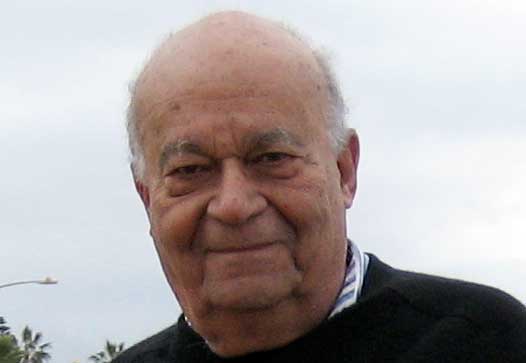
Support and Grow Your Physics Community
Irwin Oppenheim Award
Help Endow the Irwin Oppenheim Award for best paper by a young investigator in Physical Review E.
Support the Irwin Oppenheim Award
The Irwin Oppenheim Award was established in 2017 to honor the memory and celebrate the legacy of the founding editor of Physical Review E (PRE) and has been fully endowed.
This award recognizes outstanding contributions to physics by early career scientists who publish in Physical Review E (PRE). The annual award consists of a $3,000 stipend, a certificate, registration waiver and travel reimbursement to attend the APS March Meeting, and an invitation to speak at the conference.

Goal Exceeded!

About the Award
The Oppenheim Award will be the first best-paper award by a Physical Review journal. It will recognize outstanding contributions to physics by early career scientists who publish in PRE. The annual award will consist of:
- A $3,000 stipend
- A certificate citing the contributions of the recipient
- A travel allowance to attend the APS March Meeting
- An invitation to speak at the APS March Meeting
About Irwin Oppenheim
A charismatic leader and beloved colleague, mentor and friend, Irwin Oppenheim served as senior editor of PRE from its inception in 1993 until 2002. He set high standards and attracted authors and papers from new fields. Under his editorship the journal grew substantially and transitioned to online publishing. Using his stature and impeccable integrity, Irwin established PRE as the premier journal in statistical, nonlinear, and soft matter physics.
Irwin Oppenheim studied physics and chemistry at Harvard University, graduating in 1949. He performed his dissertation work under the guidance of John Gamble Kirkwood first at Caltech and then at Yale, and received a Ph.D. in chemistry in 1956. His distinguished career as professor of chemistry at the Massachusetts Institute of Technology began in 1961, when he was hired as the department’s first theoretical chemist, and spanned more than fifty years.
Oppenheim was a pioneer in nonequilibrium statistical physics and kinetic theory. He co-authored the classical text “Chemical Thermodynamics.” Among his most significant works are calculations of transport coefficients for quantum and classical liquids, the development of widely used mode-coupling theories, and the physics of slow relaxation and long-term memory in hard-sphere fluids.
Oppenheim was a dedicated teacher who taught introductory physical chemistry and statistical thermodynamics to decades of MIT undergraduate and graduate students. He mentored more than fifty students and postdocs, many of whom went on to become prominent scientists.
More about Irwin Oppenheim’s remarkable life and distinguished career, including his passion for his work, colleagues, students and mentees, can be found on MIT News.
Thank You to Our Donors
The American Physical Society would like to thank these generous donors for their contributions to the Irwin Oppenheim Award Endowment Campaign:
$20,000 and above
Bernice Buresh
$10,000 - $19,999
Joshua Buresh-Oppenheim and Rachel Schorr Hirsch
$5,000 - $9,999
Tom Keyes
$1,000 - $4,999
Anonymous (2), Brant Johnson, Carl Mazza, Cynthia Fertman, Dirk Jan Bukman, Edith Yanklowitz, Eli Ben-Naim, Eric Mazur, Gary Grest, James T. Bartis, Jerrold Oppenheim, John Deutch, Leah Oppenzato and Sonia Oppenheim, Ling Miao, Massachusetts Institute of Technology MIT, Philip Phillips, Rashmi Desai, Richard Koehl, Robert Field, Ruben Pasmanter, Steve Gorham and Candace Reed
$500 - $999
Berni Alder, Bruce Yanklowitz, C. Bryan and Kathryn Gabbard, C. M. Knobler, Diana Korzenik, Harvey and Patti Gould, Irwin and Marian Shapiro, Joel Gorham, Jonathan Machta, Margaret Kivelson, Patti Yanklowitz, Paul Davis, Paul Schechter and Gretchen Guidess, Ralph and Marcie Hirsch
Up to $499
Anonymous, Alberto Suarez, Andrea Liu, Andrei Tokmakoff, Ubbo B. Felderhof, David Hirsch, David Lide, Daxing Xiong, Gerald Hedstrom, H. Eugene Stanley, Henry Valk, Jay Dorfman, Jeffrey Corey, John Sutherland, Judith Herzfeld, Katja Lindenberg, Mary Jane Shultz, Michael Graham, Nan Waldstein, Patrick Diamond, Raymond Kapral, Richard Register, Robert Griffin, Sidney Redner, Gail and Thomas Schank, Valerie Kivelson and Timothy Hofer, Udayan Mohanty, William Goff
Ways to Give
Online
Make your secure, online gift today.
By Mail
Send your check, payable to American Physical Society, to:
APS Development Office
One Physics Ellipse
College Park, MD 20740
Please note "Irwin Oppenheim Award" in the memo.
Matching Gifts
Many companies offer a Matching Gift Program to increase the impact of employee charitable gifts. Please check with your company to see if this is an option for you.
Planned Gifts
Contact the APS Development Office (development@aps.org) to learn about additional ways to give. We recommend that you also consult with your tax advisor.
Donor Advised Funds
Maximize your philanthropic impact by making a grant recommendation to APS, and advance our mission and programs through your Donor Advised Funds.
Make a Pledge
Inform us of your commitment to a charitable gift to be paid in full over a predetermined course of time.
Download Pledge Form
